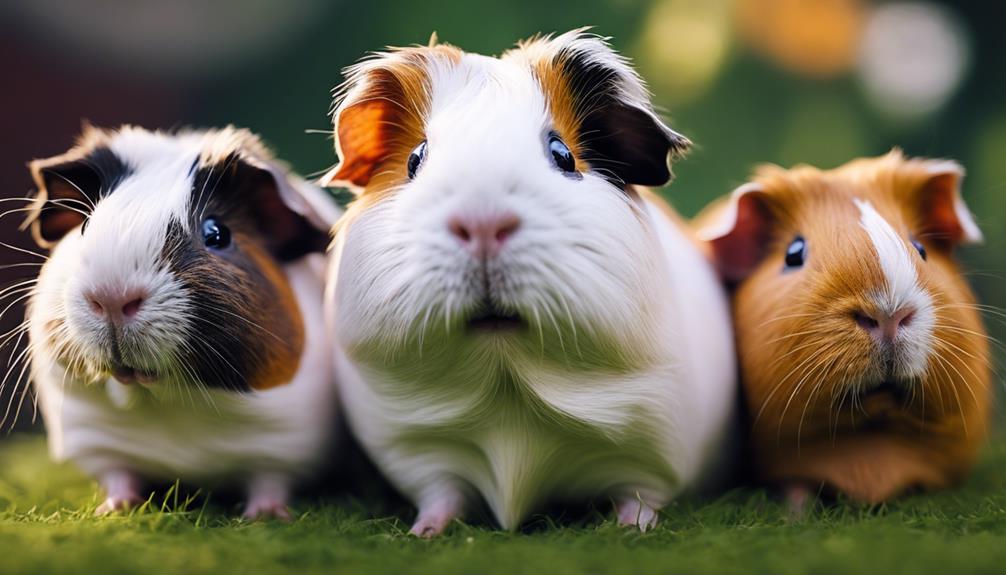How to Identify Common Health Issues in Different Guinea Pig Breeds

Guinea pigs are popular pets known for their friendly nature and cute appearance. However, like all animals, they can be prone to certain health issues. It's essential for guinea pig owners to be aware of common health problems that can affect their pets, especially since different guinea pig breeds may have specific vulnerabilities. By understanding these breed-specific concerns, owners can take preventive measures and provide appropriate care to keep their furry friends healthy and happy.
Common health issues in guinea pigs can include dental problems, respiratory infections, parasites, and obesity. Regular veterinary check-ups and a balanced diet can help prevent many of these issues. Guinea pig breeds such as the Abyssinian, Peruvian, and Silkie may be more prone to certain health conditions due to their unique coat types or genetic predispositions. Therefore, owners of these breeds should be particularly vigilant in monitoring their pets' health and seeking veterinary care at the first sign of any problems.
In conclusion, being aware of the common health issues that can affect different guinea pig breeds is crucial for responsible pet ownership. By recognizing the specific vulnerabilities of each breed and taking proactive steps to address them, owners can help ensure the well-being of their beloved guinea pigs and enjoy many happy years together.
Breeds and Health Concerns
Different guinea pig breeds exhibit specific health concerns that owners should be aware of to ensure proper care and early detection of potential issues. Among the variety of health issues seen in different guinea pig breeds, dental problems and skin issues are prevalent.
Abyssinian guinea pigs, known for their unique coat texture, are prone to skin conditions like mites and fungal infections. Regular checks for these skin problems are essential for early intervention.
On the other hand, American guinea pigs may face dental challenges due to genetic predispositions, necessitating frequent dental examinations and access to suitable chew toys to maintain good oral health.
Peruvian guinea pigs, with their long hair, are susceptible to skin infections and matting if not groomed regularly. Recognizing these breed-specific health concerns enables owners to provide targeted care and promptly address any emerging issues to ensure the well-being of their beloved pets.
Breeds and Genetic Predispositions

When considering guinea pig breeds and their genetic predispositions to certain health issues, owners should be aware of specific vulnerabilities that can impact the well-being of their pets. Understanding these genetic predispositions can aid in proactive care and early intervention. Here are some key genetic predispositions associated with common guinea pig breeds:
- Abyssinians: Prone to skin problems due to their unique hair coat.
- Peruvian guinea pigs: More susceptible to dental issues like malocclusion because of their long, continuously growing teeth.
- Shorthair guinea pigs: Have a higher risk of respiratory problems like pneumonia due to their shorter coat and sensitivity to environmental factors.
- Skinny pigs: Require extra attention to skin care and protection against external parasites due to their hairless nature.
Being aware of these breed-specific predispositions can help owners tailor their care routines to best support their guinea pigs' health and well-being. By recognizing these tendencies, owners can take proactive steps to mitigate risks and promote a healthier life for their furry companions.
Health Issues in Specific Breeds

Specific guinea pig breeds exhibit unique health issues stemming from their distinct physical characteristics and genetic predispositions. Abyssinian guinea pigs, known for their unique hair whorls, are prone to skin problems such as mites and ringworm. Peruvian guinea pigs with long hair are susceptible to matting, which can lead to skin infections and discomfort.
Skinny pigs, a hairless breed, require special care to prevent sunburn and skin injuries, necessitating UV protection. Texel guinea pigs, with their curly hair, are prone to fur matting and skin infections if not groomed regularly. Silkie guinea pigs, with their long fur, may develop eye problems due to obstructed vision, highlighting the importance of frequent grooming to prevent issues.
Understanding these breed-specific health concerns allows guinea pig owners to provide targeted care and early intervention to ensure the well-being of their beloved pets.
Breed-Specific Health Challenges

Guinea pig breeds exhibit unique health challenges that stem from their distinctive physical attributes and genetic predispositions, requiring specialized care to ensure their well-being.
- Abyssinian guinea pigs are prone to eye problems like conjunctivitis due to their rosettes near the eyes which can collect debris and cause irritation.
- Peruvian guinea pigs, with their long hair, face grooming and matting issues that can lead to skin problems if not regularly brushed and maintained.
- Skinny pigs, being hairless, need extra attention to skin care and temperature regulation to prevent skin infections and maintain body warmth.
- Texel guinea pigs, known for their curly coat, are more susceptible to skin infections and mite infestations, requiring vigilant monitoring and proper grooming practices.
These breed-specific health challenges highlight the importance of understanding and addressing the unique needs of each guinea pig breed to ensure their overall health and well-being.
Identifying Health Problems by Breed

What health problems can be identified based on the breed of guinea pig?
Abyssinian guinea pigs are known to be prone to skin issues, particularly pododermatitis, which is inflammation and infection of the feet.
Peruvian guinea pigs, with their long hair, require extra grooming to prevent matting and potential skin problems.
Shorthaired guinea pigs may be more susceptible to respiratory infections due to their shorter coats, often exhibiting symptoms like sneezing and nasal discharge.
Skinny pigs, a hairless breed, need special attention to avoid skin irritation and to regulate their body temperature effectively.
Texel guinea pigs, known for their curly hair, are prone to fur matting and potential skin infections if not groomed regularly.
Being aware of these breed-specific health tendencies can help guinea pig owners provide appropriate care and early intervention to ensure the well-being of their pets.
Common Ailments Across Breeds

Paying close attention to common ailments that transcend breed distinctions is essential for ensuring the overall health and well-being of guinea pigs. These small pets can be prone to various health issues regardless of their breed. Here are some common ailments that can affect guinea pigs of all breeds:
- Skin problems such as hair loss, red skin, and itching can be distressing for guinea pigs and require prompt attention.
- Respiratory issues like nasal discharge and wheezing are prevalent among different guinea pig breeds and may indicate underlying health concerns.
- Dental problems, including misaligned teeth or overgrowth, can cause pain and difficulty eating for guinea pigs of any breed.
- Gastrointestinal issues leading to symptoms like diarrhea and weight loss are critical to address promptly as they can quickly deteriorate a guinea pig's health.
Being aware of these common ailments can help guinea pig owners provide timely care and ensure their beloved pets lead healthy and happy lives.
Breed-Specific Health Indicators

When considering the health of different guinea pig breeds, specific indicators can offer valuable insights into potential issues affecting these unique animals. Shorthair guinea pigs may be prone to skin issues like fur mites due to their shorter coat length. Abyssinian guinea pigs with their unique rosettes may be more susceptible to skin infections in those areas. Peruvian guinea pigs with long, flowing hair may require extra grooming to prevent matting and skin problems. Texel guinea pigs, known for their curly coat, may be at higher risk for fur-related issues like tangles and matted fur. Skinny pigs, a hairless breed, may require special attention to prevent skin irritation and exposure to environmental elements.
| Breed | Common Health Issues | Specific Indicators |
|---|---|---|
| Shorthair | Skin issues, fur mites | Shorter coat length |
| Abyssinian | Skin infections | Unique rosettes |
| Peruvian | Matting, skin problems | Long, flowing hair |
| Texel | Tangles, matted fur | Curly coat |
| Skinny | Skin irritation | Hairless breed |
Frequently Asked Questions
What Is the Most Common Disease in Guinea Pigs?
Respiratory infections, dental problems, skin conditions, digestive issues, parasitic infestations, urinary tract infections, vitamin deficiencies, tumors, cancers, joint problems, and eye infections are common in guinea pigs, requiring prompt veterinary care for diagnosis and treatment.
How Do I Know What's Wrong With My Guinea Pig?
To determine health issues in guinea pigs, monitor behavior, eating habits, physical signs, weight changes, and respiratory symptoms. Dental problems, skin conditions, digestive issues, eye infections, urinary problems, parasite infestations, or hair loss could signal underlying health problems requiring veterinary attention.
How Do You Check a Guinea Pig's Health?
To check a guinea pig's health, one should examine for weight loss, dental issues, skin problems, respiratory issues, digestive problems, behavioral changes, eye infections, hair loss, lethargy, and dehydration. Regular health checks are essential for their well-being.
How Do I Choose a Healthy Guinea Pig?
When choosing a healthy guinea pig, look for bright eyes, a clean coat, proper nail length, and good hygiene practices. Ensure the pig shows no signs of pain, maintains a stable weight, and has no swellings on the body.











